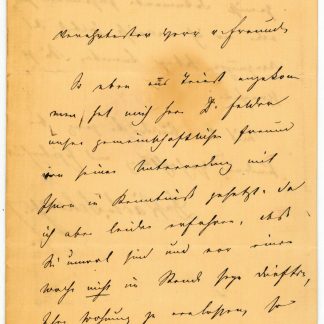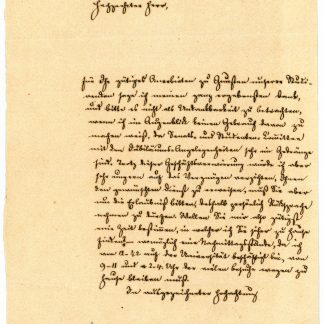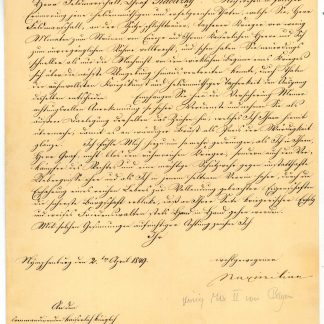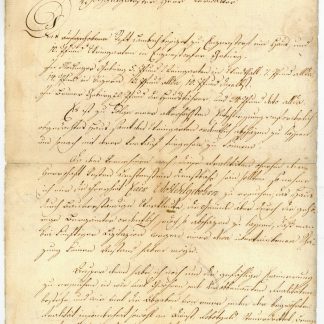"An act of patriotism": Ferdinand de Lesseps, Paul Deschanel, and the French project for the construction of the Panama Canal
Autograph letter signed.
8vo 2½ pp. on bifolium. In French.
€ 3,500.00
Historically important letter to the later French president Paul Deschanel, congratulating him on the book "La politique française en Océanie. À propos du Canal de Panama" that was written in support of the French project for the construction of the Panama canal. The text of the letter was inserted as a preface to the 1884 publication of Deschanel's work with minimal changes. Affirming the argument of the book, Lesseps stresses the "economical revolution" for France's "colonial politics" that the "piercing of the isthmus of Panama" will entail, while warning that important measures have to be taken in advance. Lesseps predicts "a bright future" for the Society Islands, "situated directly en route to Panama", if two crucial conditions are met: 1) that "the ships will find the necessary facilities and resources on Tahiti" and 2) that "we secure the surrounding ports". Therefore, he calls for the preparation of "a line of French liners across the Pacific", citing "our great Company of the Messageries Maritimes" as a model. In closing, Lesseps makes the effort seem small and invokes patriotic fervour: "It is not a question of a warlike expedition, nor of considerable financial sacrifices; nor of conquering a new colony, but only of reaping what our fathers have sown; but there is one point which dominates them all: that we arrive in time. Your book is therefore not only a complete study of French interests in Polynesia, but also an act of patriotism".
The letter must be seen as part of the publicity and lobbying campaign for the ill-fated construction project that had started in 1881. When Lesseps wrote the letter to Deschanel, his "Compagnie universelle du canal interocéanique de Panama" already struggled with a significant financing gap and lagged far behind its construction schedule. From 1885, Lesseps and his partners would start selling shares to small investors; a last stock issue in 1888, when the bankruptcy of the company was already immanent, had only been possible due to corruption. Although the company was effectively bankrupt by 1889 and all works came to a halt, France delayed its liquidation until 1892. The ensuing Panama Canal Scandal led to the collapse of three French governments and a large corruption trial against Ferdinand de Lesseps, his son Charles, and other managers. Another prominent defendant was the engineering contractor Gustave Eiffel, who was initially convicted but does not appear to have been involved in the corruption scheme and was acquitted in second trial. Lesseps' jail sentence was overturned based on a formal error, while his son served one year. Paul Deschanel (1855-1922), the recipient of the letter, was never implied in the scandal and even profited from it in the elections of 1893.
Traces of folds; minimal tears.
Paul Deschanel, La politique française en Océanie. À propos du Canal de Panama (Paris, Berger-Levraut et Cie, 1884), pp. VII-X.






